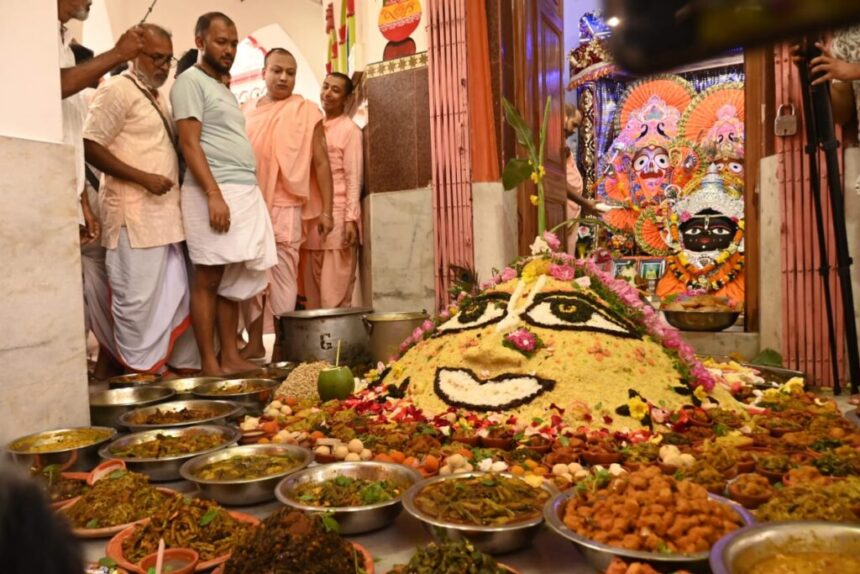🌼 Introduction: A Feast of Faith and Gratitude
Happy Annakut: Every festival in India has a story to tell — a story of love, light, and divine connection. Among these beautiful celebrations stands Annakut, a festival of food, faith, and thankfulness.
- 🪔 History of Annakut: The Divine Story of Lord Krishna and the People of Gokul
- 📜 Timeline: The Journey of Annakut Through the Ages
- 🌟 7 Amazing Facts About Happy Annakut
- 🕉️ Significance of Annakut: A Spiritual Feast of Gratitude
- 🌾 1. Gratitude to Nature and God
- 💞 2. Victory of Faith Over Ego
- 🪔 3. A Symbol of Unity
- 🌍 4. A Lesson in Environmental Balance
- 🧘 5. A Celebration of Inner Abundance
- 🌅 How Annakut is Celebrated: Rituals and Observances
- 🌞 1. Morning Devotion and Cleanliness
- 🪔 2. Preparing the Annakut
- 🌿 3. Govardhan Puja
- 🌾 4. Annakut Aarti and Darshan
- 💞 5. Community Feasts
- 🌸 6. Govardhan Parikrama
- 💫 Regional Variations of Annakut
- 💐 Heartfelt Wishing Messages for Happy Annakut
- 🧘 Importance of Annakut in Daily Life
- 🌱 1. Teaches Gratitude
- 💞 2. Encourages Sharing
- 🌾 3. Promotes Humility
- 🕊️ 4. Inspires Sustainable Living
- 💰 5. Symbol of Prosperity
- 🧠 6. Strengthens Faith
- 📚 Frequently Asked Questions (FAQs) About Happy Annakut
- 🪔 Q1. What does the word “Annakut” mean?
- 🌿 Q2. Is Annakut the same as Govardhan Puja?
- 💞 Q3. Why do people make so many dishes on Annakut?
- 🌾 Q4. When is Annakut celebrated?
- 🌸 Q5. What is the main message of Annakut?
- 🪙 Q6. How is Annakut celebrated in temples?
- 🌍 Social and Cultural Importance of Annakut
- 🌠 Conclusion: The Mountain of Gratitude and Love
The word “Annakut” literally means “Mountain of Food”, and it is celebrated the day after Diwali to express gratitude to Lord Krishna for his protection and love toward humanity.
Also known as Govardhan Puja, this festival holds deep spiritual meaning. It reminds us that nature nourishes us, faith protects us, and gratitude uplifts us.
In temples and homes across India, thousands of varieties of food are lovingly prepared and offered to God — symbolizing abundance and humility at the same time.
Annakut is not just a ritual of offering food; it is an offering of the heart, a declaration that everything we receive in life is a divine blessing.
🪔 History of Annakut: The Divine Story of Lord Krishna and the People of Gokul
The story of Annakut originates from the Bhagavata Purana, beautifully depicting the relationship between Lord Krishna and the people of Gokul (Vrindavan).
🌿 The Story Behind Annakut
Once, the people of Gokul were preparing to worship Lord Indra, the god of rain, believing that his blessings ensured fertile crops and prosperity.
However, the young Krishna questioned this practice. He asked,
“Why should we worship Indra? Isn’t it nature — the hills, the rivers, and the cows — that truly sustain us?”
The villagers realized the truth in his words and instead worshipped Govardhan Hill, offering food and prayers to nature itself.
Enraged, Lord Indra unleashed heavy rains, trying to punish the villagers. But Krishna lifted Govardhan Hill on his little finger, providing shelter for everyone — humans, animals, and nature alike — for seven days and nights.
When Indra realized Krishna’s divine power, he bowed before him and ended the rain.
To commemorate this victory of faith over ego and nature over arrogance, devotees began celebrating Annakut, symbolizing gratitude, humility, and divine protection.
🏔️ Why a “Mountain of Food”?
The people of Gokul prepared massive quantities of food to offer to Govardhan Hill, thanking Krishna for saving them. The Annakut, or “mountain of food,” symbolizes abundance, gratitude, and the infinite blessings of God.
📜 Timeline: The Journey of Annakut Through the Ages
| Era | Event / Evolution |
|---|---|
| Dvapara Yuga | Krishna lifts Govardhan Hill; villagers offer food to nature. |
| Vedic & Epic Age | Annakut becomes part of post-harvest gratitude rituals. |
| Medieval India | Vaishnavite traditions formalize Annakut in temples. |
| Bhakti Era (13th–17th Century) | Saints like Vallabhacharya popularize Annakut as a devotional feast. |
| Modern Period (Post-1900s) | Annakut becomes a central Diwali tradition across India and abroad. |
| Today | Annakut is celebrated globally by devotees of Krishna and Swaminarayan communities. |
🌟 7 Amazing Facts About Happy Annakut
Annakut is celebrated a day after Diwali as part of Govardhan Puja.
Devotees prepare over 1,000 dishes in temples like Swaminarayan Akshardham and ISKCON centers worldwide.
The festival is deeply rooted in Lord Krishna’s Govardhan Leela, a symbol of faith and nature’s protection.
In Gujarat and Rajasthan, Annakut also marks the start of the New Year (Vikram Samvat).
The food offered includes sweets, fruits, grains, curries, and snacks, beautifully arranged like a hill.
Annakut Aarti and Govardhan Parikrama (circumambulation) are sacred rituals performed on this day.
The celebration emphasizes eco-conscious living, respect for nature, and thankfulness for food and life.
🕉️ Significance of Annakut: A Spiritual Feast of Gratitude
🌾 1. Gratitude to Nature and God
Annakut teaches us that nature is divine, and every grain we eat is sacred. Offering food to the Lord symbolizes thankfulness for Earth’s bounty.
💞 2. Victory of Faith Over Ego
Indra’s arrogance and Krishna’s compassion highlight the importance of humility and surrender. It’s a reminder that faith and devotion always triumph over pride and power.
🪔 3. A Symbol of Unity
In Gokul, every villager — rich or poor — contributed to the Annakut. This tradition continues today, promoting community harmony and collective worship.
🌍 4. A Lesson in Environmental Balance
By worshipping Govardhan Hill and cows, Annakut reinforces the value of living in balance with nature — protecting land, animals, and the environment.
🧘 5. A Celebration of Inner Abundance
While the physical Annakut is a mountain of food, spiritually, it represents the mountain of love, devotion, and gratitude that one must build in their heart.
🌅 How Annakut is Celebrated: Rituals and Observances
🌞 1. Morning Devotion and Cleanliness
Devotees wake up early, bathe, wear new clothes, and clean their homes and temples — symbolizing purification of the soul and surroundings.
🪔 2. Preparing the Annakut
Hundreds of food items — sweets, savories, curries, rice, fruits — are prepared with devotion.
Each item is placed carefully before the deity in the form of a mountain.
In temples like Swaminarayan Mandirs, devotees prepare food without onion or garlic, maintaining purity.
🌿 3. Govardhan Puja
Devotees make small idols of Govardhan Hill using cow dung, flowers, and clay.
Offerings are made to Lord Krishna, cows, and nature as a form of respect and protection.
The ritual emphasizes gratitude and eco-spirituality.
🌾 4. Annakut Aarti and Darshan
The beautifully decorated food mountain is offered to Lord Krishna with Aarti, bhajans, and chanting. Afterward, the food becomes prasadam, shared among all devotees.
💞 5. Community Feasts
Many temples organize mass feasts where everyone — regardless of status — eats together, reinforcing equality, love, and unity.
🌸 6. Govardhan Parikrama
In holy places like Mathura, Vrindavan, and Nathdwara, thousands of devotees perform parikrama (circumambulation) of the Govardhan Hill — an act of faith and gratitude.
💫 Regional Variations of Annakut
| Region | Celebration Type |
|---|---|
| Uttar Pradesh | Known as Govardhan Puja; involves Govardhan Parikrama and massive food offerings. |
| Gujarat | Marks New Year Day; Annakut and Chopda Pujan (new business accounts). |
| Maharashtra | Families make small Govardhan idols and perform puja at home. |
| Rajasthan | Devotees offer Annakut to Shri Nathji in Nathdwara. |
| Swaminarayan Temples (Worldwide) | Grand Annakut with 1,000+ dishes, bhajans, and aarti ceremonies. |

💐 Heartfelt Wishing Messages for Happy Annakut
🌿 May this Annakut bring a mountain of happiness, health, and success into your life.
💖 Wishing you and your family a blessed Annakut filled with love, faith, and divine blessings.
🪔 On this auspicious day, may Lord Krishna lift all your worries and shower endless joy upon you.
🌾 Let’s celebrate gratitude and faith this Annakut with open hearts and smiling faces.
🌸 Happy Annakut! May your home always overflow with abundance and happiness.
🧘 Importance of Annakut in Daily Life
🌱 1. Teaches Gratitude
Annakut reminds us to be thankful for even the smallest blessing — food, family, and nature’s gifts.
💞 2. Encourages Sharing
By offering food and sharing it as prasadam, we learn generosity and compassion — essential for a fulfilling life.
🌾 3. Promotes Humility
Lord Krishna’s act of lifting Govardhan Hill shows that true greatness lies in service and humility, not in pride.
🕊️ 4. Inspires Sustainable Living
Annakut connects humans with nature, urging us to protect the environment and live in ecological balance.
💰 5. Symbol of Prosperity
Annakut also aligns with economic renewal, as merchants begin new ledgers and pray for a prosperous year ahead.
🧠 6. Strengthens Faith
It reminds us that when we surrender to divine will, no storm can harm us — whether physical or emotional.
📚 Frequently Asked Questions (FAQs) About Happy Annakut
🪔 Q1. What does the word “Annakut” mean?
The word Annakut means “mountain of food.” It represents the offering of a vast variety of dishes to Lord Krishna as a gesture of gratitude.
🌿 Q2. Is Annakut the same as Govardhan Puja?
Yes, Annakut is another name for Govardhan Puja, both celebrating Lord Krishna’s lifting of Govardhan Hill and the victory of devotion.
💞 Q3. Why do people make so many dishes on Annakut?
Preparing multiple dishes symbolizes abundance, devotion, and thankfulness toward God for his endless blessings.
🌾 Q4. When is Annakut celebrated?
Annakut is celebrated on the first lunar day of Shukla Paksha in the Kartik month, usually the day after Diwali.
🌸 Q5. What is the main message of Annakut?
The core message is gratitude to nature and faith in divine protection. It inspires people to live with humility and compassion.
🪙 Q6. How is Annakut celebrated in temples?
Temples organize grand food offerings, aarti, bhajans, and darshan, followed by distributing prasadam to devotees.
🌍 Social and Cultural Importance of Annakut
Annakut carries timeless values that remain relevant even in the modern age:
🌾 Promotes vegetarianism and healthy living.
💞 Encourages charity and community bonding.
🪔 Strengthens faith and devotion across generations.
🌍 Reminds us of sustainability and environmental care.
💰 Inspires ethical wealth creation and gratitude for prosperity.
In a fast-paced world, Annakut stands as a gentle reminder to pause, give thanks, and celebrate the abundance of life.

🌠 Conclusion: The Mountain of Gratitude and Love
Happy Annakut is not just about food — it’s about faith, humility, and thanksgiving. It teaches that every grain of food we eat is a divine blessing and that gratitude multiplies abundance.
From Krishna’s divine act of lifting Govardhan Hill to modern celebrations in temples worldwide, Annakut continues to inspire people to live with faith, balance, and compassion.
In a world often obsessed with taking, Annakut teaches the beauty of giving — offering love, food, and prayers to God and society alike.
So, this Annakut, as you light the diyas and arrange the feast, remember:
The greatest offering is not food, but a heart filled with devotion and gratitude.
🌸 Final Wish
💫 May this Happy Annakut bring prosperity, happiness, and divine grace to you and your loved ones. May Lord Krishna’s blessings fill your life with endless joy and abundance. 🌾✨
🔖 Key Takeaways
Festival Name: Annakut / Govardhan Puja
Main Deity: Lord Krishna
Theme: Gratitude, Nature, Faith, Prosperity
Celebrated In: India and worldwide Vaishnavite communities
Core Message: Humility, Devotion, and Abundance









**breathe**
breathe is a plant-powered tincture crafted to promote lung performance and enhance your breathing quality.
Wow, fantastic blog layout! How long have you been blogging for? you make blogging look easy. The overall look of your web site is fantastic, as well as the content!